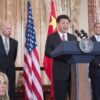On Thursday, a federal court reportedly denied the plea of a collection of government employee unions to prevent the Trump administration from moving forward with plans to significantly decrease the number of people working for the federal government.
According to the decision made by United States District Judge Christopher Cooper, the unions are required by federal law to submit their challenge before the Federal Labor Relations Authority (FLRA), which is the agency that is responsible for deciding labor relations within the federal bureaucracy, rather than through a federal district court.
With this decision, the Justice Department of President Trump has achieved yet another success.
The department is currently defending itself against hundreds of left wing lawsuits that challenge a wide variety of executive actions taken by the president.
These lawsuits challenge the administration’s efforts to reduce expenditure and reorganize government agencies.
In the complaint, the unions attacked the administration’s intentions for more mass layoffs, often known as a reduction in force, as well as its offer for the majority of federal employees to accept a buyout.
The lawsuit also questioned the mass terminations of probationary employees.
An additional federal judge had earlier dismissed an attempt to halt the buyouts in a separate lawsuit; nevertheless, the battle against the firings of probationary employees is still ongoing when a coalition of unions filed yet another lawsuit on Thursday.
The National Treasury Employees Union (NTEU), the National Federation of Federal Employees, the International Association of Machinists and Aerospace Workers, the International Federation of Professional and Technical Engineers, and the United Auto Workers are the organizations that have initiated this particular case.
The unions stated that the intentions of the administration violate the separation of powers as well as statutes that govern the manner in which the federal government can take steps to reduce the number of employees.
Cooper did not take a stance on those concerns; rather, he decided that the unions had brought their challenge to proceedings that were not appropriate.
[READ MORE: DOJ Prosecutor Resigns Rather Than Open Inquiry Into Biden Climate Spending Racket]



